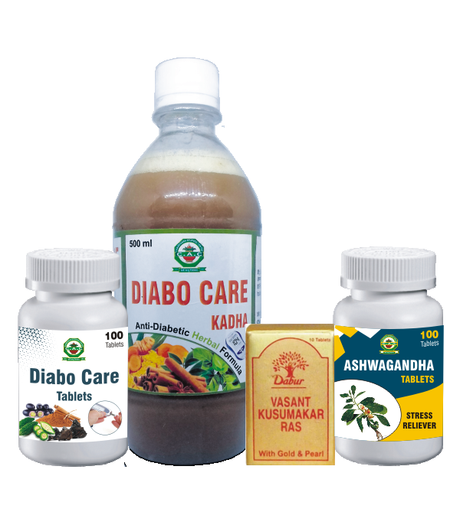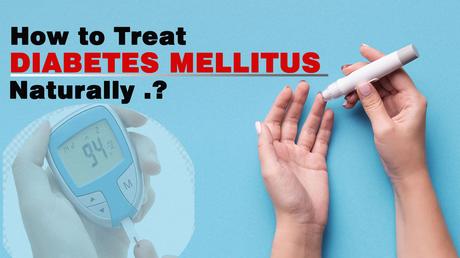What is Diabetes Mellitus?
Did You Know…
Blood “sugar” really means blood glucose.
Diabetes mellitus is the immune-related disorder in which blood glucose (sugar) levels are high because the body is unable to produce enough insulin to meet its necessary needs. Diabetes damages the nerves and causes a sensation problem.
Diabetes occurs in one of the following situations:
The pancreas (an organ behind your stomach) is not able to produce little insulin or no insulin at all. Insulin is a naturally occurring hormone that is produced by the beta cells of the pancreas.
What is an Ayurvedic View of Diabetes Mellitus?
In Ayurveda, diabetes mellitus is correlated with ‘’Madhumeha’’ (Hyperglycemia) in which a person passes honey-like (sweet) urine. In Ayurveda, there are 20 types of Prameha (Urological disorder).
It occurs due to the excessive use of Amla (sour), guru (heavy to digest), navannapana (food preparation from newly harvested grains), Snigdha (unctuous), Asya sukha (sedentary lifestyle), etc. The aggravated Kapha dosha leads to disturbance in Kapha primarily which is associated with Pitta. This imbalance of doshas move towards Medo dhatu (fatty tissues) which affect fat metabolism, lead to a further imbalance of kleda. Hence, all kleda accumulates in the urinary system and there will be increased production of urine leading to excessive urination, gradually leading to Prameha.
What are the Types of Diabetes?
There are mainly two types of diabetes mellitus:
Type 1 diabetes mellitus
Type 1 diabetes occurs because the beta cells that produce insulin in the pancreas are damaged. In this type, the pancreas produces little or no insulin, so sugar cannot get into the body’s cells for use as energy. People must use insulin injections to control their blood glucose levels. It is the most common form of diabetes in people who are under the age of 30, but it can also occur at any age. Some of the people with diabetes are diagnosed with type 1.
Type 2 diabetes mellitus
In type 2 diabetes the body doesn’t produce enough, or the insulin does not work properly. Most of the people are suffering from type 2 diabetes mellitus. It occurs most often in people who are above the age of 40 but can also occur even in childhood if there are risk factors regarding this. Sometimes, it can be controlled with a combination of diet, weight management, and exercise.
Other types of diabetes are gestational diabetes (high blood glucose level during pregnancy), surgery, use of certain medications, and various illnesses.
What Causes Diabetes?
The main cause of diabetes mellitus is not known. The following causes that may increase your chance of getting diabetes:
- Family history of diabetes mellitus
- Being overweight or obese
- Physical stress (like surgery or any chronic illness)
- Use of certain medications, like steroids
- Injury to the pancreas due to infection, tumor, or surgery
- Autoimmune diseases
- High blood pressure
- Abnormal blood cholesterol or triglyceride levels
- Age (risk increases with the age)
- Smoking
- History of gestational diabetes
Scientists believe that an environmental factor such as viral infection or a nutritional factor causes the immune system to destroy the insulin-producing cells.
It is important to know that sugar itself does not cause diabetes. Eating a lot of sugar causes tooth decay, but it does not cause diabetes mellitus.
What are the Symptoms of Diabetes?
The symptoms of diabetes include:
- Increased thirst
- Increased hunger (especially after food intake)
- Dryness in mouth
- Frequent urination or excessive urination
- Unexplained loss of weight (even though you are eating and feel hungry)
- Weakness or feeling tired
- Blurring of vision
- Numbness or tingling sensation under the soles of feet or palms of hands
- Slow-healing of sores or cuts
- Dryness and itchy skin
- Urinary tract infections
- Feeling confused
- Headache
- Feeling cranky
- Poor coordination
- Bad dreams or nightmares
- Unable to focus on one subject
- Numbness in your mouth and tongue
What is the Panchakarma Treatment of Diabetes Mellitus?
In Ayurveda, Panchakarma procedures have been used for many ages for purifying and naturally detoxifying the body. Panchakarma procedures like Abhyanga, Swedan, Basti, and Virechana are very effective in the treatment of Diabetes Mellitus. Chandigarh Ayurved Centre provides wonderful therapies that work on the root cause of the diabetes mellitus.
Abhyanga is useful in relieving the stress by relaxing the muscles and improves the blood circulation which further causes increased glucose absorption.
Swedan therapy opens the pores, eliminates the doshas and cleanses the system through the skin through sweat.
Virechana– Virechana is a medicated purgation therapy that eliminates toxins from the body which gets accumulated in the liver as well as the gallbladder. Doshas are removed in the form of feces through the rectum and cleanses the gastrointestinal tract.
Basti– Basti karma eliminates the toxins from the body through the rectal canal. In this treatment, there is the introduction of Medicinal substances, such as medicated oil and decoctions in a liquid medium into the anal region of the patient with the help of rubber catheters under the supervision of an expert Ayurvedic doctor.
Chandigarh Ayurved Centre provides you the best herbal and natural treatment of Diabetes Mellitus formulations which is ‘’Diabetes Mellitus Care Kit’’, This kit contains vasant kusumaker rasa, Ashwagandha Tablet, Diabo care tablet, Diabo Care Kadha, and Diabo Care Kadha. The regular use of this kit shows effective results.

-
Vasant Kusumakar Rasa:
Vasant Kusumakar Ras is a herbo-mineral formulation which comprises of Swarna Bhasma, Mukta Pishti, Vanga Bhasma, Raupya Bhasma, Praval Pishti, Ras Sindoor, Abhrak Bhasma, Loha Bhasma, Naga Bhasma, Vasaka (Adhatoda Vasica), Haldi (Curcuma Longa), Shatavari (Asparagus Racemosa), Ikshu (Saccharum Officinarum). These ingredients are used as anti-hyperglycemic, aphrodisiac and cardio-protective. This formulation normalizes and stabilizes the blood glucose level. It also shows effective results in urinary disorders, nervous disorders, and geriatric diseases.
Recommended Dosage: Take 1 tablet twice a day with normal water.
-
Ashwagandha Tablet:
Ashwagandha tablets are prepared from the pure extract of Ashwagandha. In Ayurveda texts, it is mentioned that this herb shows anti-diabetic, antioxidant, anti-cancer, anti-inflammatory, anti-stress properties. It also regulates the metabolism of sugar and cholesterol. These capsules are useful in treating asthma, arthritis, tuberculosis, anxiety, bipolar disorder, insomnia, tumors, leukoderma, bronchitis, backache, fibromyalgia, menstrual problems, and chronic liver disease.
Recommended Dosage: Take 1 tablet twice a day with normal water.
-
Diabo care tablet:
Diabo care tablet is a pure Ayurvedic formulation which consists of Karela, Gurmur, Dalchini, Ashwagandha, Jamun, Shuddha Shilajeet, and Neem. These are very effective in maintaining the blood sugar level. Being the best detoxifier, it is effective liver detoxification and controls high blood pressure. Jamun is a well-known herb treating Diabetes, thus it reduces the level of glycosuria.
Recommended Dosage: Take 1 tablet twice daily.
-
Diabo Care Kadha:
Diabo care kadha comprises of ingredients like Methi dana (Trigonella foenum- graecum), Ashwagandha (Withania somnifera), Haldi (Curcuma longa), Dalchini (Cinnamomum zeylanicum), etc. This kadha regenerates lipid mechanism, preventing microvascular damage and diabetic retinopathy. It is also helpful in the burning of palms as well as soles, non-healing wounds, skin infections, unexplained extreme fatigue, etc.
Recommended Dosage: Take 20 ml twice a day with normal water.

